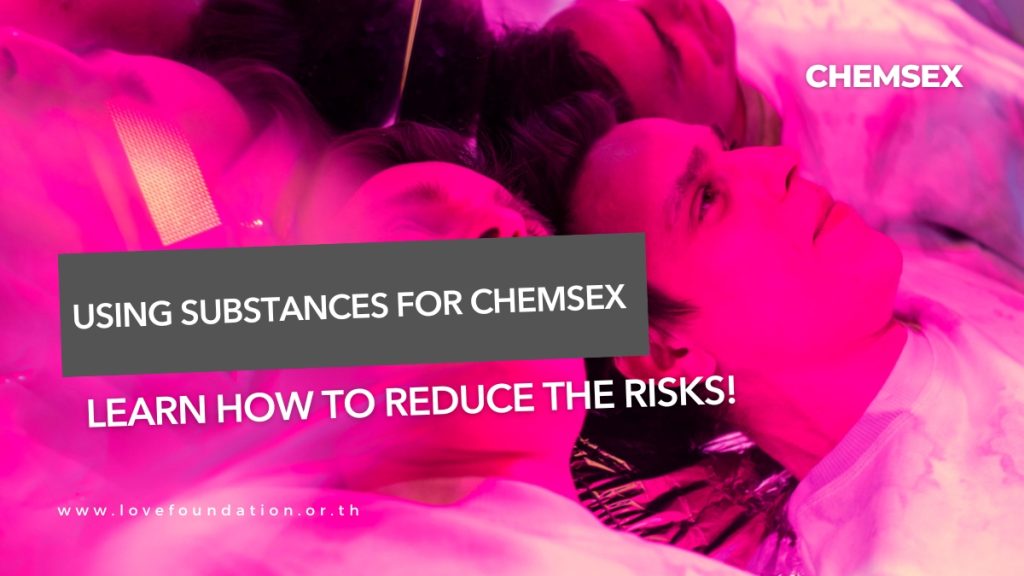In recent years, the trend of using substances to enhance sexual experiences, known as “Chemsex,” has grown, particularly among gay, bisexual, and other men who have sex with men (GBMSM) and transgender women (TGW). These individuals often use stimulants to increase excitement or pleasure during sex. The use of these substances reduces inhibitions, which may make sexual encounters seem more thrilling. However, it also poses severe health risks that can have long-term effects on both the body and the mind.
List of Contents
Substances Used in Chemsex
The use of drugs in Chemsex not only enhances excitement or pleasure during sex but can also have serious long-term effects on the body and mind. Common drugs used in Chemsex include methamphetamine, gamma-hydroxybutyrate (GHB), and ketamine, each with different effects. The consequences of using these substances can result in sustained harm.

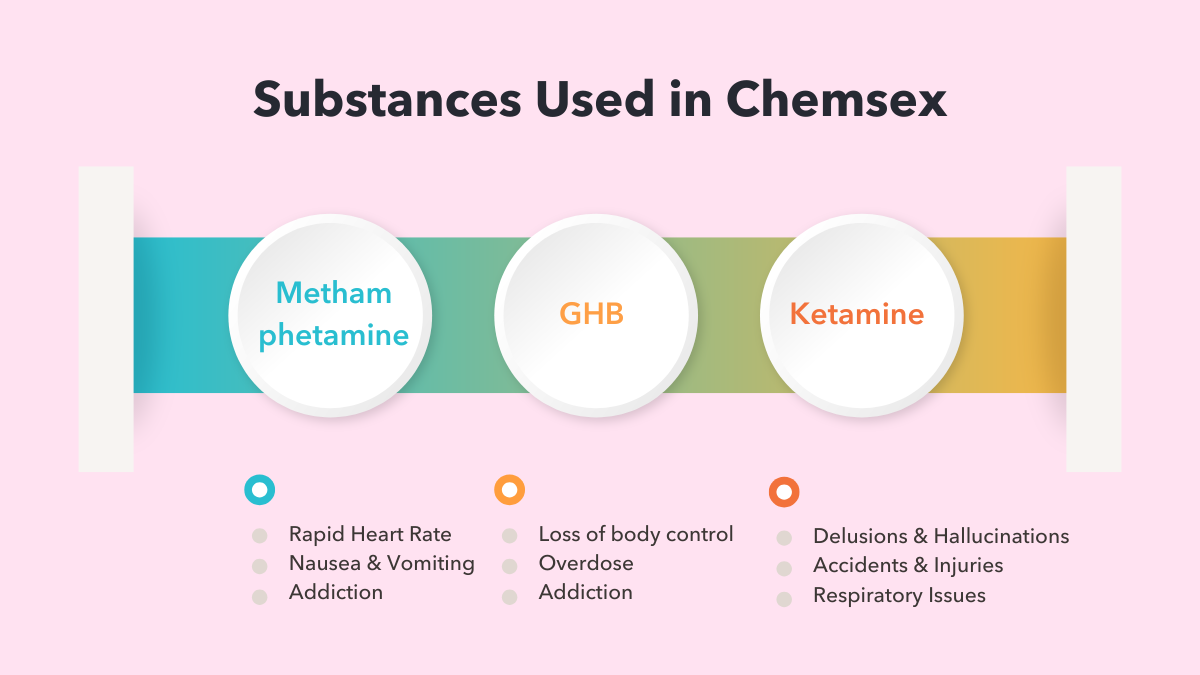
Methamphetamine
Methamphetamine is a potent stimulant that, when used, causes users to feel alert, energetic, and more powerful. It is often used to prolong sexual activity or enhance pleasure during sex. However, methamphetamine also has several dangerous side effects:
- Rapid heart rate and high blood pressure: The nervous system is highly stimulated, causing irregular and accelerated heart and blood circulation functions, which may lead to heart failure or a stroke.
- Nausea and vomiting: These side effects can make the user feel uncomfortable when using the drug repeatedly.
- Addiction: Methamphetamine can give users intense pleasure and energy, but frequent use leads to a higher dependence on the substance, resulting in addiction that is difficult to control.
Continuous and high-dose use can damage the nervous system and cause mental health issues like mood swings, anxiety, and delusions. It also weakens the immune system, making users more susceptible to infections.
Gamma-Hydroxybutyrate (GHB)
GHB is a chemical often used to enhance sexual arousal and help the body relax, expanding the pleasure of sex. It affects the nervous system and makes users feel light and relaxed. However, GHB also has dangerous side effects, such as:
- Loss of body control: GHB’s calming effect can make users feel so relaxed that they lose control over their bodies, putting them at risk of assault or physical accidents.
- Overdose: Taking too much GHB can lead to deep sedation or unconsciousness, and in some cases, it can be fatal.
- Addiction: Repeated use leads to tolerance, requiring higher doses to achieve the same effects, which may result in addiction.
When used with other stimulants, such as methamphetamine or alcohol, the side effects become more severe, increasing the risk of emergencies.
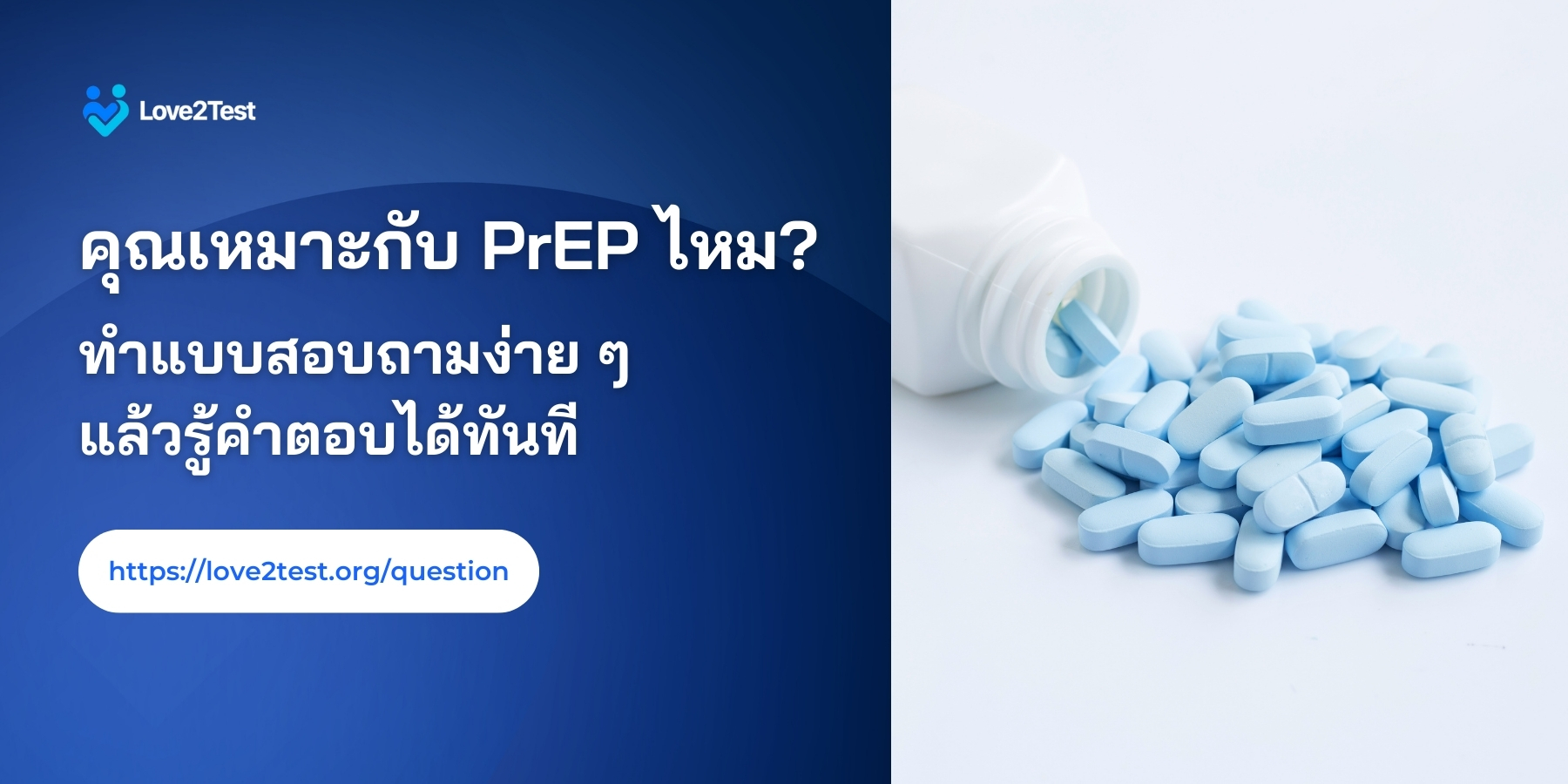
Substances type Ketamine
Ketamine is a drug often used for deep sedation or to induce a dissociative state, making users feel detached from their normal reality. Some individuals may experience a sensation of floating or drifting in space, which is why it is sometimes used during sex to heighten the experience. However, it carries several risks:
- Delusions and hallucinations: Ketamine can cause users to experience delusions and hallucinations, impairing their ability to differentiate between reality and imagination, leading to poor decision-making and risky behavior.
- Accidents and injuries: Ketamine impairs the body’s and brain’s ability to control movement, increasing the risk of accidents such as falls or injuries caused by uncontrolled actions.
- Respiratory issues: Large doses of ketamine can cause breathing to stop or become irregular, which can be life-threatening.
While ketamine has medical uses (such as being used as an anesthetic), using it in sexual situations without medical supervision or in uncontrolled environments can result in harmful consequences. The use of these substances impacts the body in several ways. Not only do they damage the nervous system, but they also weaken the immune system. Additionally, repeated use can lead to addiction, with the body requiring increasingly larger amounts. This increases the long-term risk of substance dependency.
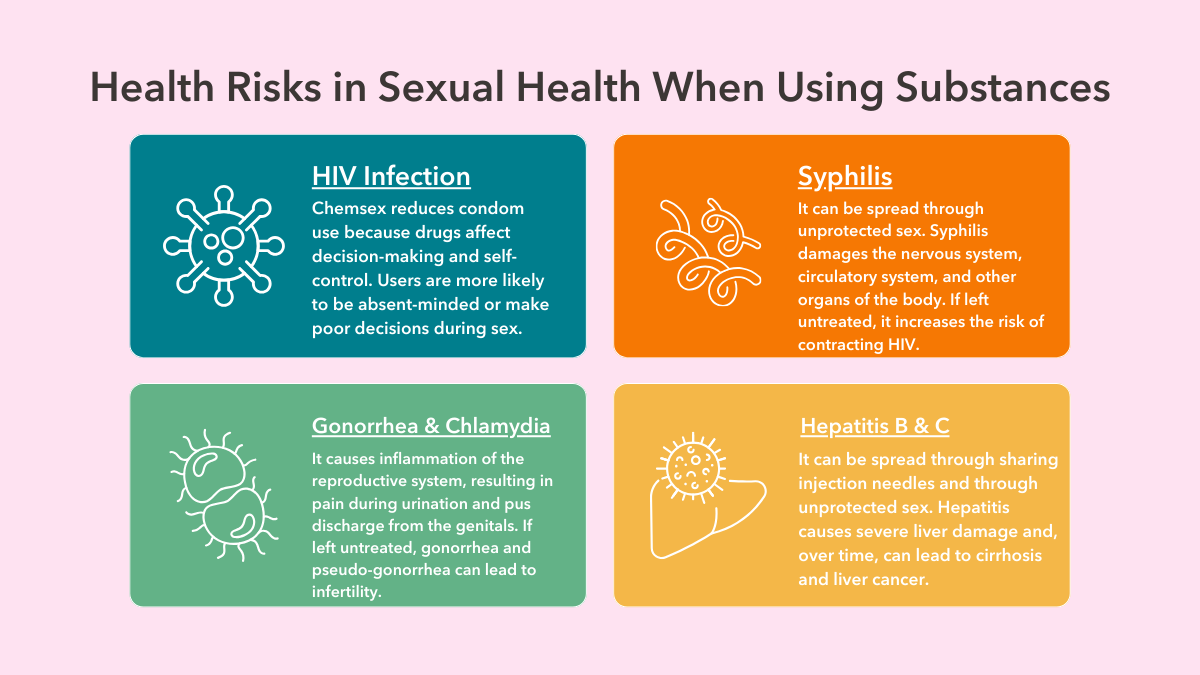
Health Risks in Sexual Health When Using Substances
The use of drugs during sexual activity in Chemsex leads users to engage in risky behaviors, lacking protection and caution, which significantly increases the risk of contracting HIV and other sexually transmitted infections (STIs). The details are as follows:
HIV Infection
Chemsex reduces the use of condoms because drugs affect the ability to make decisions and self-control. Users often lack awareness or make reckless decisions during sex, resulting in the failure to use condoms, which are an effective method for preventing the transmission of HIV.
Additionally, sharing needles is a major risk factor for HIV infection, especially when drugs like methamphetamine are used, as these substances allow viruses to easily enter the bloodstream of users. The lack of access to clean needles and insufficient awareness of the dangers of sharing needles greatly increase the risk of transmission.
HIV infection not only impacts the physical health of those infected but also requires lifelong treatment with antiretroviral therapy (ART) to control the virus load in the body. ART is continuous and expensive, and individuals with HIV may experience side effects from the medication, such as allergic reactions, fatigue, and other long-term health problems.
Sexually Transmitted Infections (STIs)
In addition to HIV, Chemsex increases the risk of contracting other sexually transmitted infections, which can also have serious effects on health and quality of life. This is especially true for those who engage in unprotected sex and often have multiple partners. Some examples of STIs that are more common among individuals participating in Chemsex include:
Syphilis
Syphilis is a sexually transmitted infection that can spread through unprotected sexual contact. If left untreated, syphilis can cause damage to the nervous system, circulatory system, and other organs in the body. Furthermore, syphilis increases the risk of contracting HIV, especially when sores are present on the genitals or other parts of the body.
Gonorrhea and Chlamydia
Gonorrhea can cause inflammation in the reproductive system, leading to painful urination and discharge from the genitals. If left untreated, both gonorrhea and chlamydia can lead to chronic health problems and infertility.
Hepatitis B and C
Hepatitis infections can spread through shared needle use and unprotected sex. Hepatitis B and Hepatitis C viruses cause severe liver inflammation, which can lead to cirrhosis and liver cancer in the long term.
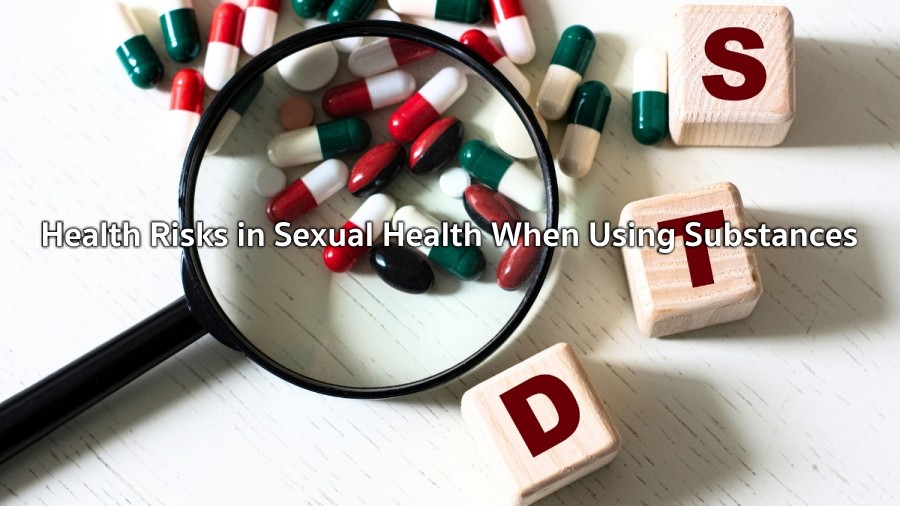
These sexually transmitted infections not only cause painful physical symptoms and increase the risk of complications but also have psychological effects and can harm interpersonal relationships. Moreover, the spread of these infections in communities places a burden on public health systems and makes it more difficult to control outbreaks.
✦ Emotional Distress and Mental Burden of Infected Individuals and Their Families
Sexually transmitted infections, including HIV, often cause psychological stress for both the infected individuals and their families. The awareness of the health impact and the need for long-term treatment may lead to anxiety, depression, and fear of social exclusion. Many individuals living with HIV face stigma and misunderstanding from their communities, which makes them feel isolated and lack social support.
✦ The Need for Long-Term Treatment and Side Effects of Medication
Individuals living with HIV or other severe sexually transmitted infections often require ongoing, long-term treatment. For example, HIV treatment involves antiretroviral therapy (ART), which is expensive and has side effects that may cause fatigue, nausea, diarrhea, or long-term health impacts. Moreover, patients must adhere to their medication regimen to reduce the virus load and maintain stable health. This is a lifelong treatment, which places both a financial and emotional burden on those infected.
Psychological Effects of Substances Use in Sexual Contexts
Using drugs to enhance sexual pleasure has severe mental health impacts. Beyond physical issues, users face numerous psychological challenges, detailed below:
- Depression and Anxiety
- After the drug’s effects wear off, the body enters a state of withdrawal, leaving the user feeling intensely sad and anxious. The elevated mood during drug use disrupts brain chemical balance, and when the effects fade, the brain cannot immediately readjust, leading to high levels of depression or anxiety. Some may feel hopeless or have negative thoughts, which can lead to chronic depression if drug use continues.
- Delusions and Hallucinations
- Frequent and high doses of drugs can impair the nervous system, causing delusions and hallucinations. For example, users of ketamine may feel like they are floating or experience distorted realities. These hallucinations can lead to irrational fears and dangerous behaviors, such as self-harm or harm to others. In severe cases, hallucinations can prevent users from distinguishing reality, affecting their daily lives.
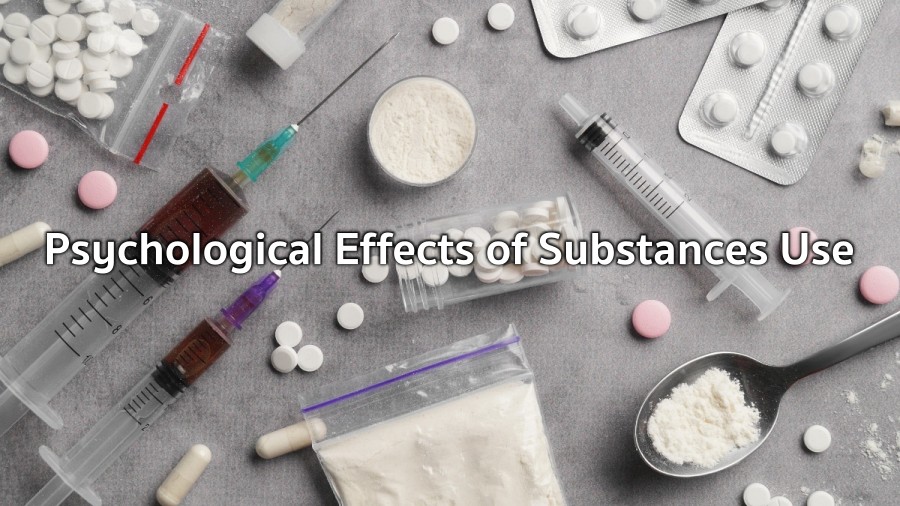
- Drug Dependence
- Using drugs to enhance sexual pleasure often quickly leads to addiction. Many users feel they need drugs to boost confidence or enjoyment during sex and feel incapable of engaging in sex without them. This creates a difficult-to-break cycle of addiction. Such dependency not only increases the user’s tolerance, requiring higher doses, but also deteriorates physical and mental health, making normal life unmanageable.
- Long-Term Mental Health and Social Impacts
- Continued drug use impacts communication skills and the ability to connect with others. Some users feel isolated, lacking support from society and family, and may experience worsening relationships with those around them. Additionally, feelings of loneliness and addiction can lead to a loss of life quality, making recovery challenging.
Risks of Addiction and Daily Life Impact
Regular drug use to enhance sexual experiences can lead to severe addiction, affecting various aspects of daily life, including:
- Loss of Self-Control: As addiction develops, users increasingly crave drugs and are unable to stop on their own, requiring larger amounts to achieve the same satisfaction.
- Work and Personal Relationship Issues: Addiction impacts work performance and personal relationships. Users often lack concentration, struggle to work effectively, or have issues in relationships with others. They may also exhibit irritability or emotional outbursts toward loved ones, damaging personal connections.
Preventive and Harm Reduction Strategies for Chemsex
While using drugs for sexual enhancement carries high health risks, several strategies can help reduce harm and prevent associated risks:
Condom Use and PrEP
Using condoms is a fundamental and effective way to prevent HIV and other sexually transmitted infections. It reduces the risk of transmission during unprotected sex. For those at higher risk or likely to engage in chemsex, taking PrEP (Pre-Exposure Prophylaxis), an antiviral medication before potential HIV exposure, can effectively reduce the risk of HIV. PrEP is particularly suitable for those engaging in frequent high-risk sexual activities. Using PrEP in conjunction with condoms provides optimal protection.
Seeking Psychological Counseling for Substances Use
Meeting with mental health professionals or counselors is an option that can help reduce the desire to use drugs for sexual pleasure. Those who use drugs often struggle with emotional issues or face depression or anxiety. Psychological counseling can help them manage these emotional challenges and learn coping mechanisms. Additionally, therapy or mental health recovery can help reduce risky behaviors associated with drug use.
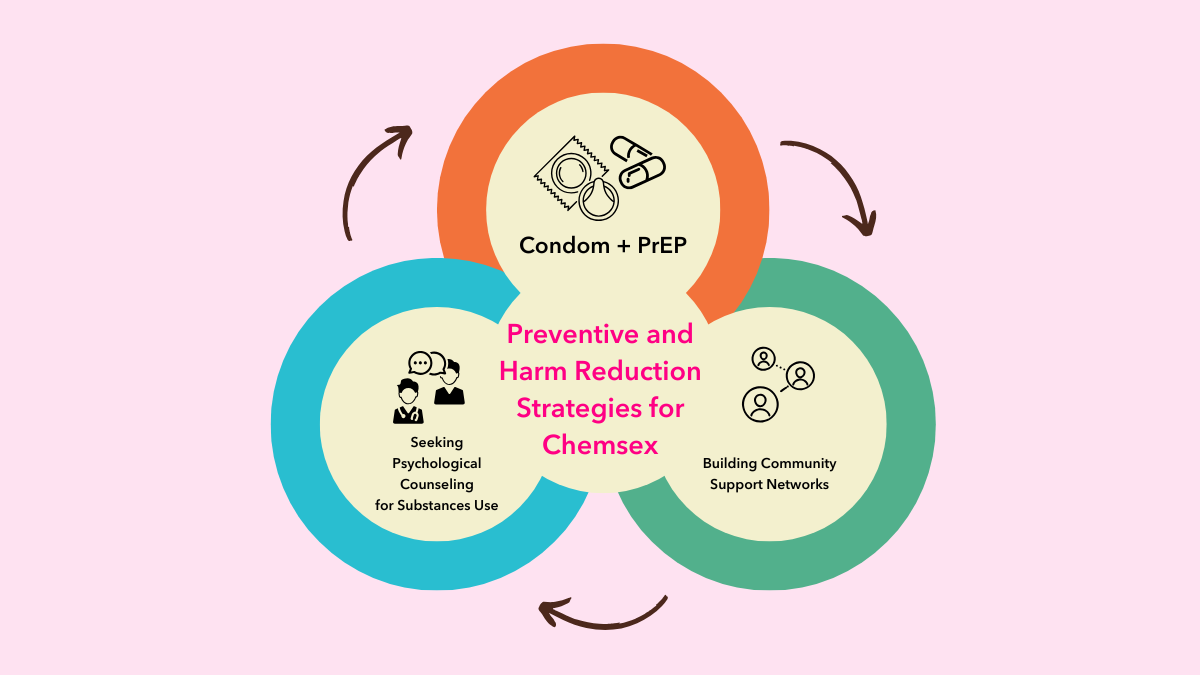
Building Community Support Networks
Having a strong support network within the community can help drug users feel supported and not alone. An understanding and supportive community can offer guidance on quitting drugs and provide encouragement throughout recovery. Moreover, a strong community network fosters a safe environment, which is crucial for reducing risky behaviors and increasing the chances of overcoming addiction.
Related Article
Conclusion
Although using drugs to enhance sexual experiences may seem appealing in terms of enriching the experience. It carries severe risks to both physical and mental health. Prevention and risk reduction are essential for those who aim for long-term health and well-being. Using condoms, taking PrEP, seeking psychological counseling, and finding support from the community can help create a safer environment and reduce potential harm from chemsex. Building an understanding, non-judgmental society allows those facing drug use challenges to find suitable solutions and sustainably lower risks to their sexual and overall health.
References:
CHEMSEX คืออะไร ไม่ใช่เรื่องใหม่สำหรับการใช้ยา ปาร์ตี้
- pulse-clinic.com/th/chemsex
Chem Sex คืออะไร
- rainbow-project.org/what-is-chem-sex
Chemsex ในด้านความสุข ความปลอดภัย และสุขภาพ
- viivhealthcare.com/ending-hiv/stories/community-engagement/chemsex/
